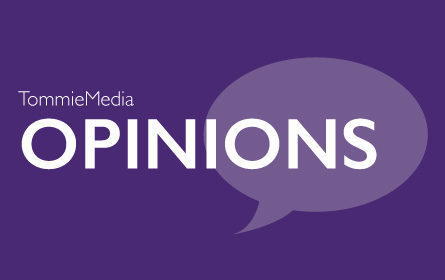Back in high school, I was talking to a friend about my general dislike for John Lennon’s song “Imagine.” During the conversation I brought up my faith and how that fueled the perspective I was coming from.
“It always comes back to that with you,” he said. “Save that for church.” He didn’t mean it maliciously, but that did not change the feeling of injustice I experienced. Since then, episodes such as this one have recurred, with comments becoming more subtle but just as cutting over the years.
Though I’ve always been a firm believer that there is an appropriate time and place for everything, there is a difference between knowing the appropriate setting for a particular conversation and believing religion to be something that can be switched on and off. Thinking religion can be left at the door shows a poor understanding of it.
But what is religion, really? According to Webster’s New World College Dictionary, it is a “belief in a divine or superhuman power or powers to be obeyed and worshiped as the creator(s) and ruler(s) of the universe (and) expression of such a belief in conduct and ritual … often involving a code of ethics and a philosophy.” For me, it is all that and more.
Religion is the placement of one’s faith in a higher power that governs all of existence. That’s not just a belief. It is — cheesy, but true — a lifestyle. The simple fact that a person believes all to be connected to a higher existence is going to change everything about that person, as life for him or her is not random, but tied together by a supreme entity (or entities). And if everything is tied together by a higher power, isn’t that a big deal?
If one knew with certainty that everything in one’s day somehow tied back to that higher power it would be more than reasonable for that person to live with that sharp awareness at every moment. On the other hand, it would be unreasonable for that person to possess said certainty, and yet ignore it half the time. The point is, whether one believes life depends on a god or not is going to change the way one lives, and there are people who live with the certainty that it does. These people are religious.
In one of his articles, Patrick F. Fagan outlines the areas of life that religion affects. These include happiness, family life, relationships and health. Furthermore, he lays out research data which states that 85 percent of the American population is affected by religion. Of these, 81 percent are positively influenced and 4 percent are negatively influenced. Either way, however, religion clearly imprints itself deeply in most of the U.S. population. Seeing it is so profoundly rooted in human beings who practice it, I deem it unreasonable to think of religion as an accessory. A belief that impacts the totality of life is not easily removed and re-applied; people should not be asked to do so.
Is it bad to be unable to separate oneself from one’s religion? No. In fact, it is more respectable for someone to consistently stick to what they hold true, rather than be willing to send their beliefs on a smoke break. That doesn’t mean one is bound to talk about religion every hour of every day, as that could easily become obnoxious and inappropriate, but religion is part of identity. It is bound to radiate even when the practitioner is silent.
Looking back at the conversation I had after class in 2012, I don’t find it odd and inappropriate that my opinion was shaped by something that is such an important part of me. What I find odd and inappropriate was the scandal that the free expression of this part of me at school caused, and the subsequent expectation that I’d “save it for church.”
Leti Mariani can be reached at mari8259@stthomas.edu.



YES
This is an important article cautioning against religious modernism, and dare I say liberal protestantism. If the author or a reader is interested in looking into this further, I suggest possibly picking up “Between Heaven and Hell” by Peter Kreeft.
I have had many similar experiences! Thank you for writing this article, it’s really a great expression of what I believe to be a justifiable and somewhat preventable frustration among people following a faith nowadays. It’s important that those who do not find themselves in a religious context know what is included for those who do.
Great article. Expresses exactly how I feel. I don’t understand it when people say “they don’t wear their religion on their sleeve”? What does that mean anyway? Or when people criticize others (eg. polititians especially) for expressing a personal faith issue as if it was a NEGATIVE to be a faithful person. Aren’t most faithful religious people good and trustworthy? With the fringe FEW who distort and misrepresent a religious group- why all the negative stereotype and “judging” of the majority of GOOD religious? It’s difficult for non believers to get the inability to separate religious belief from a personality- you can’t just turn beliefs on and off. Saving it for church? They miss the point.